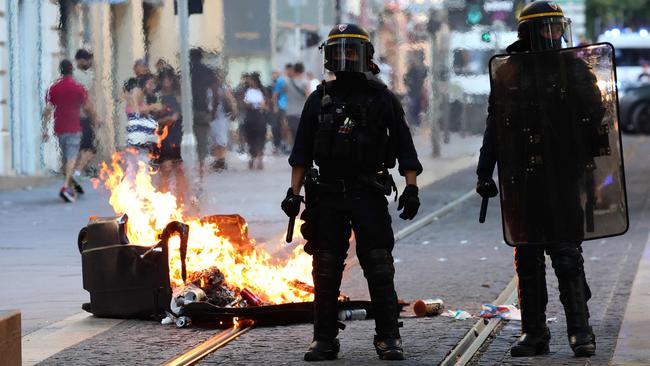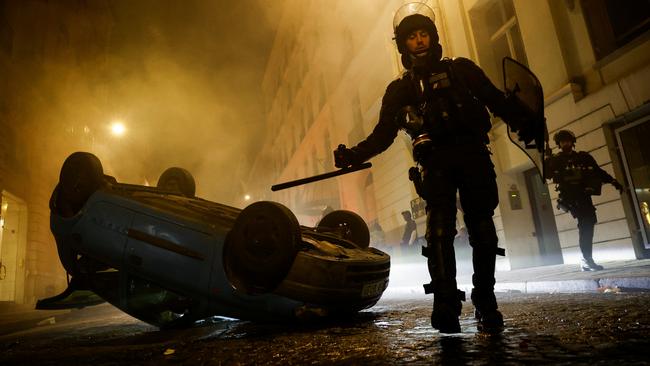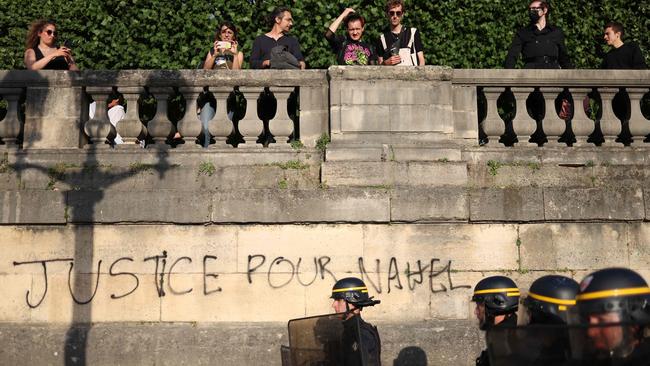Behind French riots lie years of anger over police force conduct
Law-enforcement tactics that once remained in the shadows are now surfacing in videos, prompting investigations and inflaming the public.

When 17-year-old Nahel Merzouk was killed by a police officer last week in a Paris suburb, Mourad Telhaoui thought about the time his own son, a young man of North African origin like the slain teenager, was stopped by police two years ago.
They pulled him over as he was driving home from work. Three officers spoke abusively to him and handed out tickets for traffic violations that he didn’t commit, according to Telhaoui and his son.
The incident was caught on a dashboard camera and included as evidence in a complaint he filed against the police, which is now under court review.
Young men of African and Arab origin across France complain of persistent police abuses, ranging from racial profiling and harassment to assaults and shootings in the working-class suburbs, where many minorities live.
Widespread recording of interactions between police and people from minority communities – via the use of smartphones, dashboard cameras and police body cams – has fuelled public anger. A video of a police officer shooting Merzouk during a traffic stop helped ignite a wave of rioting that has gripped France.
“Since we were little, it’s the same for all of us; when we are stopped by the police, we have this feeling of fear, a knot in the stomach,” said Telhaoui’s son, now 26. “At some point, we have to express our anger.”
President Emmanuel Macron huddled with his ministers late on Sunday as 45,000 police officers fanned out across France and cities braced for another night of rioting.
The unrest has included rioters setting fire to hundreds of vehicles and dozens of buildings, attacks on police stations and the home of a Paris mayor was ramraided and set alight. His wife and one of his two children were injured.
French police say poorer areas require intense policing because they are rife with drug trafficking, gang activity and violence, and the French government says its police forces aren’t racist.
“All accusations of racism or systemic discrimination by law enforcement are totally unfounded,” France’s Foreign Affairs Ministry said.

Two of France’s largest police unions say they are fighting a war, describing rioters as “vermin”. “Faced with these savage hordes, asking for calm is not enough, it must be imposed,” the unions said.
Earlier in the week, rioters set alight a youth centre attended by Merzouk for after-school activities while his mother, who raised him alone, was working, says Rossana Morain, the centre’s director. Employees at the centre would pick up Merzouk from school and help him with his homework, she said.
“We are very sad for Nahel, because he was a nice boy,” Morain said last week as volunteers washed soot off charred office equipment from the centre. “There isn’t a healthy relationship with the police.”
A sign at a makeshift memorial where the teenager was killed read: “How many Nahels weren’t filmed?”
A 2017 study by France’s independent civil rights agency found that men perceived to be of African or Arab origin were about three times as likely as white men to have experienced a police identity check in the previous five years, and nine times as likely to have been stopped more than five times.
They are also more likely to be stopped than minorities of Turkish descent in Germany, according to a study led by Sebastian Roché, a criminologist at France’s National Centre for Scientific Research.
Ilies, a 25-year-old of Moroccan origin who asked to be identified only by his first name, said he was sitting on a bench next to his home in a working-class section of eastern Paris on the evening of July 14, Bastille Day, last year. Several police were walking by when some youths near him launched fireworks at the officers.
The officers charged. One officer hit him in the shoulder and mouth with a baton, dislodging several teeth and fracturing his jaw, said Ilies.
Four days later, he and his lawyer, Avi Bitton, filed a complaint with the inspector-general of the National Police. A year later, they haven’t received a response or any indication that an investigation is under way, Bitton said.

The officer who hit Ilies, meanwhile, showed up at his apartment building three months ago, pulled him aside, asked him if he knew who hit him and told him to drop his complaint, he said, adding that one of the other officers allowed a police dog to press its paws against his chest.
“I was scared,” he said. “I said I didn’t know who it was.”
A spokesman for the Paris prefecture, which oversees police in the French capital, said the complaint brought by Ilies is under investigation and declined to comment.
When news of Merzouk’s death first broke, Agence France-Presse, the country’s largest newswire, was among the first to report on it. AFP cited anonymous police officials saying officers shot the driver after he attempted to run them over. That article relied on police officials because they were the only sources available when the story broke, said AFP spokesman Boris Bachorz.
Hours later, a video taken by a witness emerged on social media. It showed two officers standing at the side of Merzouk’s car, which was stopped, and one pointing his handgun into the driver’s-side window.
Someone can be heard shouting: “You’re going to get a bullet in the head!” Then the car starts to move past the police officer, who fires a single shot. Lawyers for Merzouk’s family say witnesses have said the threat was shouted by one of the police officers.
Based on the video, AFP published a new story less than two hours later that invalidated its earlier reporting based on police sources, Bachorz said.
Footprints mark the floor of the youth centre Merzouk used to attend, which was set alight during the unrest last week.
French prosecutors said last week the officer didn’t use his gun legally. They pressed preliminary charges of voluntary homicide against him, and he has been detained. His lawyer, Laurent-Franck Liénard, said on French television the officer has asked Merzouk’s family for forgiveness. Liénard denied his client ever said Merzouk tried to run over the officer.
The complaint by Telhaoui’s son, which is under review, wouldn’t have stood a chance without the video to counter the police statements, Telhaoui said.
Telhaoui and his son were standing last week outside the charred youth centre where Merzouk went after school. They helped employees carry a soot-covered printer out of the centre’s office.
“Idiots did this. It’s not justified,” Telhaoui said, pointing to the burnt-out building. “The situation is becoming uncontrollable.”
The Wall Street Journal



To join the conversation, please log in. Don't have an account? Register
Join the conversation, you are commenting as Logout